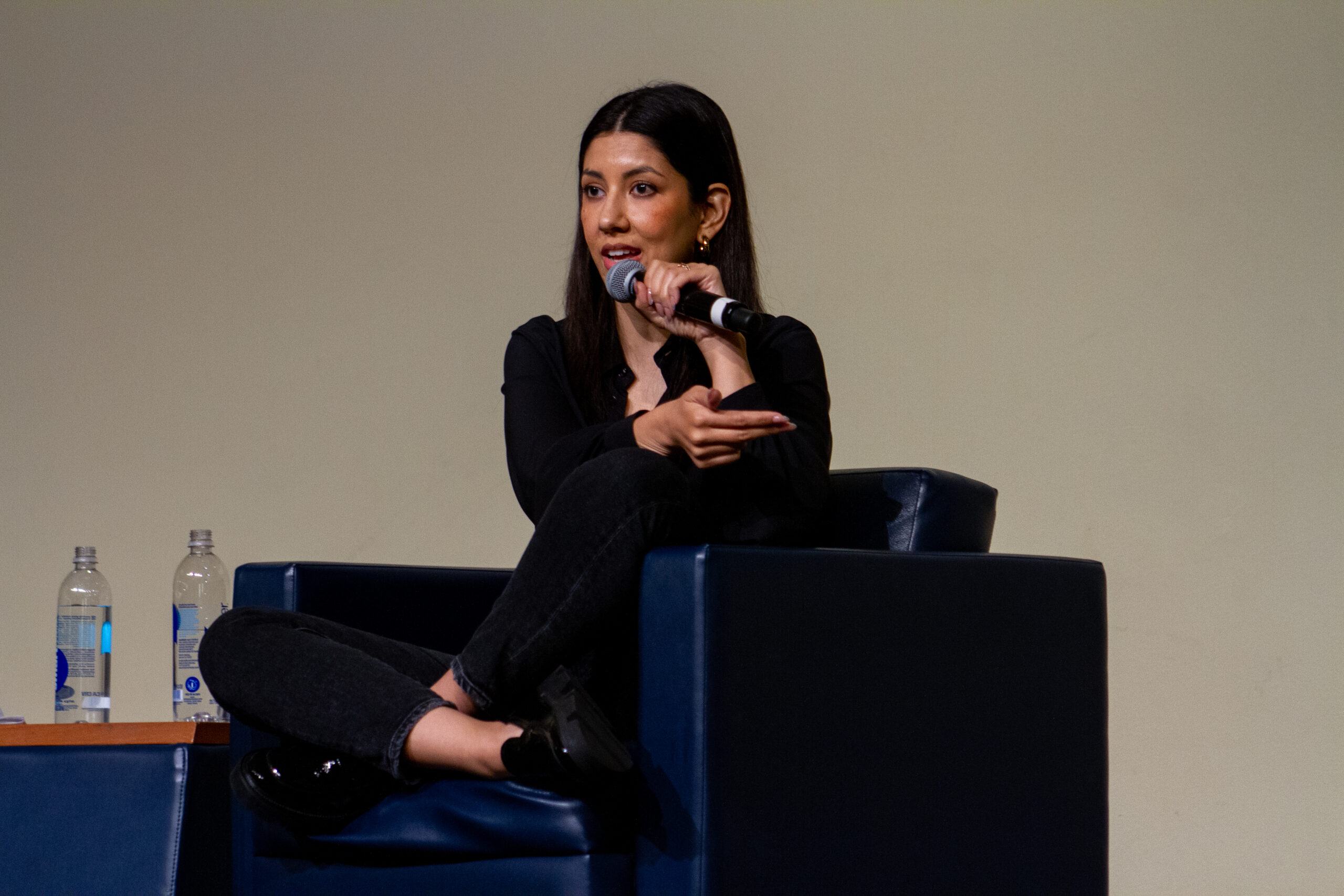Stephanie Beatriz offers insight on representation and personal authenticity at ULS

Actress, singer and advocate Stephanie Beatriz brought sincerity and heart to the students in attendance at Tuesday’s University Lecture Series (ULS), sharing what her work and life have taught her about identity, representation and personal authenticity.
Beatriz referred to individual uniqueness as a “spark.” In her years spent in auditions and casting rooms, she learned that this spark was something that made everyone inherently special and valuable.
“Every single person in this room has an individual, bright shining spark,” she said. “You may not feel it all the time, but it’s true. You’re the only version of yourself on this planet.”
Moderator and Campus Activities Board Vice President Jonathan Borelley’s introduction of Beatriz was interrupted by cheers and applause from the excited crowd as she took the stage shortly after 8 p.m. The hourlong discussion that followed was filled with personal anecdotes and heartfelt advice, complemented by the actress’ charm and humor.
She drew the largest crowd of any ULS speaker this academic year, filling the Marshall Student Center Ballroom. Before Tuesday’s event, preregistration sold out on BullsConnect with 770 students signed up. This is over double the 349 students who preregistered for the most recent ULS of Olympic gold medalist Aly Raisman in March.
It didn’t take long for Beatriz to get comfortable in front of the crowd of over 700 applauding students as she sat cross-legged in her chair, relating to students and the moderator by sharing the roadblocks she faces as a bisexual Latina in entertainment.
Much of Beatriz’s recent work, such as playing Mirabel Madrigal in Disney’s “Encanto,” led her to explore her Colombian heritage and consolidate that aspect of her identity.
Growing up, Beatriz said she saw poor representation of Colombians, with most shows or movies about them focusing on drugs. She felt that “Encanto” was a step in the right direction and showed how much representation can matter for minorities.
“It’s amazing to think that, in the minds of these little kids that are watching this film, when someone says Colombia to them in the future they won’t immediately go to drugs,” she said. “They’ll think of ‘Encanto’ and magic.”
Misconceptions of the bisexual community also used to be common in media, according to Beatriz. Grappling with these misrepresentations negatively influenced how she viewed her own identity.
“The representation up to this point has been that bisexuals are oversexed, like they’re nefarious and evil and running around sleeping with everyone,” she said.
“That’s what I thought was bisexuality. I would see stories like that and think ‘Oh, what’s going to happen to me? What do I do?’”
Being the representative of change through media platforms was important to Beatriz, and her opportunity to inspire a new generation was exciting and a step away from the harmful misconceptions that plagued the entertainment industry when she was growing up.
Staying true to herself was a critical aspect in maintaining the self-love she encouraged the audience to build upon and work toward. Her identity is something she said she learned to value over time, and her strengthened confidence in herself opened her up to numerous opportunities of growth, both personal and work-related.
“For many of us, our existence is political, and there’s no escaping that,” she said. “There’s no sort of taking my bi-ness out of my pocket and dropping it in a back room. I could hide it, but I’d still show up as a woman and a Latina.”
It was this journey with self-confidence that eventually taught Beatriz to value the things about herself that made her special.
“It took a really long time for me to accept that I had something to say and something to bring to the table,” Beatriz said. “It took me even longer to realize what I bring to the table — my specific self, my specific view on the world and my specificity.”
Years spent having her identity misrepresented by others inspired her to be more vocal about social justice issues, Beatriz said.
“It’s important for me to look at everyone with empathy and honesty and see what situations would look like from their shoes,” she said.
“Like, how can I help? I talk about stuff that I feel is important to me, stuff that I would talk about with my friends. What are you doing in your life, in this one lifetime that you have, to make [life] better for other people?”
During the 15-minute Q&A at the end of the lecture, Beatriz answered a few questions from eager audience members with topics ranging from mental health management to her least favorite crewmembers on set. Even when her time was running out, she offered to stay longer to hear from more students.
Many students shared that Beatriz’s work, primarily in her roles in “Brooklyn Nine-Nine” and “Encanto,” deeply resonated with their own lives.
Sharing how she learned to navigate adulthood and other difficult situations, she said self-love played a crucial part in learning to overcome personal struggles and accepting herself as an individual.
“It’s the judgment of self I think I’m doing better with, knowing it’s impossible to maintain [the belief that] everything’s fine all the time,” she said.
“Sometimes, you’re not going to be able to handle all that stuff, but it’s the judgment itself … It’s actually a really bad space to be in. At least if you’re not judgemental of yourself, then you can move through whatever is challenging you in the moment. Then you have clarity.”






